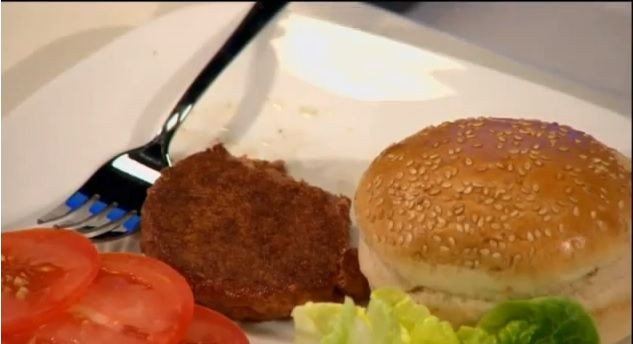World’s First Lab-Grown Burger: The London Taste Tests Are In [VIDEO]

Costing close to half a million dollars to make, the world's first lab-grown hamburger has finally been given a proper taste test — and the results are in. Artificial meat grown in laboratories is being hailed as an innovative way to save countless animals from slaughter every year. But beyond being animal-friendly, the process — if eventually commercialized — could save billions of dollars a year in meat processing, reduce the chances of foodborne illness, and lower greenhouse gas emissions by millions of metric tons yearly.
The cultured meat revolution is being pioneered by Professor Mark Post, who received grant money from the Dutch government and began his research in 2008. Since then, his lab has been able to take cow muscle cells and grow them in laboratory conditions. The burger was made from over 20,000 strips of lab-grown muscle sinew. But the taste of such a new meat form was long unknown.
Because of the costs involved in the development of the lab-grown meat, the burger rings in at around £250,000 (just under $400,000). A large amount of the money came from an initially anonymous donor, who was thanked for bankrolling much of the research. It was later revealed that Sergey Brin, Google's co-founder, was the mystery benefactor. He is quoted as saying that he made the donation for "animal welfare reasons."
Preparation And Taste Test
The hamburger was prepared by frying a patty of the lab-grown meat in sunflower oil with a dab of butter to give it some fullness. Because the "in vitro meat" was not grown with fat cells, it was completely meat and thus lacked the juicy savory flavor of real meat. Hanni Rutzler, a food scientist, said that the burger tasted "close to meat" and that it was a little harder and drier than she had expected.
Josh Schonwald, author of The Taste of Tomorrow, said that "absence is the fat ... it's a leanness to it but the bite feels like a conventional hamburger." His qualm also was the lack of fat, flavoring, and spice.
But not to worry, Post said that within the next few months, he plans on a Lab Meat 2.0, which will contain lab-grown fat and produce a juicier and more flavorful burger.
The only previous taste test to be performed on lab-grown meat was by a Russian journalist who was visiting Post's lab and had stolen a piece of cultured pork. His review was far less favorable, calling it "chewy and tasteless."
With a population expected to grow to nine billion people by the middle of the century, farming and raising of livestock are not sustainable. Forests have been clear-cut to make space for grazing area, reducing biodiversity as a whole on the planet, with ecosystems and species being threatened daily by encroachment for farming. Post, therefore, sees this meat revolution as a way to save the world from such detrimental effects.
He expects lab-grown meat to hit the store shelves within 10 to 20 years.



























